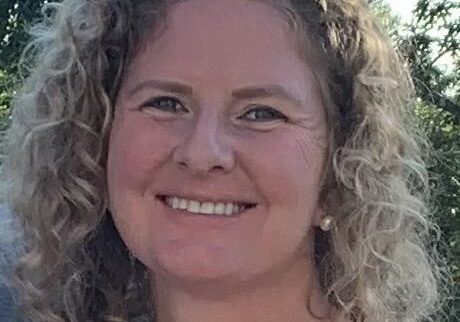ALUMNS IN ACTION: Emma Kagel ’97, Bioethecist

As a student at Renbrook, Emma’s indomitable spirit was clear. She excelled while doggedly coping with hearing aids, painful ear infections, surgeries, and the use of a transmitter, or “trainer,” that assisted her in hearing her teachers and participating in class discussion. Emma says, “In high school, I lost the remainder of my residual hearing unexpectedly in a matter of minutes, rendering me ’stone deaf.’ I was fortunate to have already established care with a renowned cochlear implant surgeon who brought the technology over from Europe.”
Cochlear implants require a great deal of adjustment and training for the recipient. Combined with “my existing robust skills to compensate, including lipreading,” they allowed Emma “inclusivity and opportunity in the mainstream,” which was her goal.
In the late 1990’s, the Presidential Commission for the Study of Bioethical Issues released its white paper on the need to empower adolescent autonomy and privacy in medical decision-making. Emma and her family made choices that were right for her, but the new technology sparked controversy. In the Deaf community, some objected to cochlear implants as “fixing a medical condition,” rather than “affirming a culture,” a controversy that persists to this day.
“There was a very charged public debate, including the throwing of tomatoes at patients exiting hospitals having had the implant surgery,” Emma remembers. “The controversy has been challenging to witness and really grounds me daily in my work to remember the power of implicit and explicit bias and the need to be neutral and to appreciate the stakeholder’s narrative and values. My work has allowed me to make peace with the inherent divide between two communities, as well as work to solidify the bridge that exists between the two.”
When Dolly the sheep was cloned in 1996, the debate that followed caught Emma’s interest. Moral questions surrounding scientific research became her focus at Connecticut College, where she designed her own major in bioethics within the Philosophy Department. Summer internships deepened her determination. At Boston Children’s Hospital, she observed cases that raised ethical questions: How much say should an adolescent have in their own treatment? What if parents want to refuse blood transfusions or other medical practices because of their religious convictions?
Emma went on to earn a Juris Doctor degree at the University of Washington, then a Master’s in Bioethics at Harvard Medical School. She trained to be a support to patients, families, medical practitioners, and hospitals facing conflicts. She would help to set policy and see that it was implemented justly by promoting dialogue and ethical decision-making in difficult medical issues.
Emma went to work for Centura Health System in Denver, Colorado, where she developed and implemented a Medical-Legal Partnership Program, designed to improve social determinants of health. Emma oversaw Centura’s 17 hospitals’ ethics committees and consulting services, as well.
As a clinical bioethicist, Emma went on rounds with clinicians in cases involving critical care, such as pediatrics and transplants. When practitioners and families were in conflict, she could reframe it as an ethical issue. What a provider might label as non-adherence could be a quality-of-life issue for the patient. Emma appreciated that ethical behavior and legal compliance are not always the same thing. In consultation with clinicians, administrative leadership, and families, she helped work through solutions.
Emma filled a similar role at the Mayo Clinic in Rochester, Minnesota, as a Clinical Ethics Program Manager. Across the Mayo network, she systematized ethics advisory boards, compliance, and patient experience initiatives. She continued bedside consultations and played an educational role among specialists and departments, offering ethics training and courses.
Emma recalls that at the Mayo Clinic, end-of-life issues were particularly acute. Patients came from all over the world, and for many it was a last-chance stop, a place to look for miracles. Emma was concerned with patients’ dignity and choices, playing a role in setting goals of care and making decisions about how they would be carried out. When the pandemic hit, people couldn’t travel to die at home, so she was involved with developing artificial intelligence simulations, ways to help patients feel less alone.
In 2021, Emma moved to the Boston area, to be closer to family. Beth Israel Lahey Health is connected with major research centers at Tufts, Harvard, and UMass, and Emma’s role has shifted from the clinical to the research field of bioethics. She works in compliance, where academics and industry meet. Her job is to identify conflicts of interest in medical research. How will the results of research be used clinically? Is reporting transparent? How is artificial intelligence being used? How much do we rely on algorithms, and which algorithms? How do we protect patient privacy? How is the administration of new technology overseen? The bioethicist has a key role in anticipating and interrogating the future of medicine.
The field of bioethics is coming into its own as more degree programs, funding, and certifications become available. At the same time, bioethical issues are proliferating rapidly, and challenges for medical providers, patients, and society at large will require a greater role for professionals like Emma Kagel.
Acting as a mediator among biotechnology, medical practitioners, and patients’ cultural contexts has been challenging, but so important and rewarding, Emma says. Her work is rooted in the conviction that value conflicts should be resolved between patients and doctors, rather than dictated by public policy. Success depends on empathy and clear communication. Emma is compassionate and forgiving, but as her colleagues know, “I don’t tiptoe.”